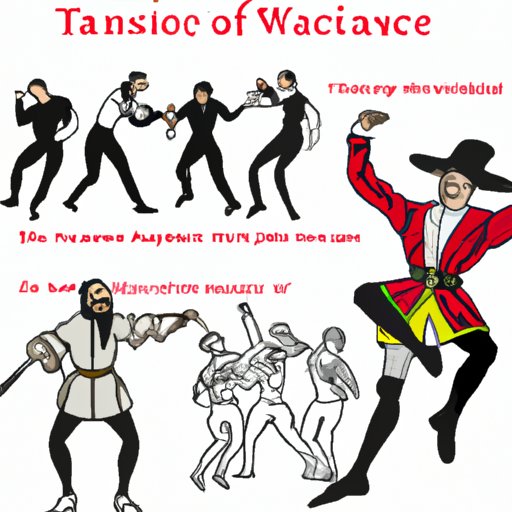Introduction
The Dancing Plague of 1518 was a strange phenomenon that occurred in Strasbourg, France in July of that year. Hundreds of people began to dance uncontrollably, sometimes for days at a time, until they collapsed from exhaustion. While the event has been largely forgotten by history, it is still an intriguing mystery that has captured the imagination of historians and scientists alike. The purpose of this article is to explore the Dancing Plague of 1518, its causes and its lasting impact on society.

Historical Overview of the Dancing Plague
The Dancing Plague of 1518 began on July 14th when a woman known as Frau Troffea stepped into the streets of Strasbourg and began to dance. Within a few days, dozens of other people had joined her, and soon there were hundreds of people dancing in the streets. The dancers continued to dance for days, sometimes weeks, until they collapsed from exhaustion or even death. By the time the plague had run its course, some 400 people had been affected.
The impact of the Dancing Plague was felt far beyond the immediate area. Reports of the phenomenon spread quickly throughout Europe, and many people feared that it was a sign of impending doom. The church denounced the dancers as possessed by demons, while others saw it as a form of mass hysteria. Whatever the cause, the Dancing Plague of 1518 left a lasting impression on those who witnessed it.
Exploring the Causes of the Dancing Plague
Since the event occurred centuries ago, the exact cause of the Dancing Plague remains a mystery. Historians have come up with various theories to explain the phenomenon, but none have been conclusively proven. Here we will look at some of the most popular explanations for the Dancing Plague.
Contemporary Perspectives
At the time, many people believed that the Dancing Plague was caused by a supernatural force, such as possession by demons or a curse from God. Others believed that it was caused by a form of mass hysteria, with the dancers following the example of Frau Troffea and becoming caught up in the frenzy. These explanations have since been largely dismissed, as they do not take into account the fact that the dancers did not seem to be in any distress and were actually enjoying themselves.
Role of Religion
Some have suggested that the Dancing Plague was caused by religious fervor, with the dancers believing that they were being called upon by God to perform a sacred ritual. This theory is supported by the fact that the dancers often chanted religious phrases as they danced, and that the event occurred during a period of intense religious activity in Strasbourg.
Role of Music
Another popular explanation for the Dancing Plague is that it was caused by the music that was present at the time. Some believe that the repetitive nature of the music created a trance-like state in the dancers, causing them to become lost in the rhythm and unable to stop dancing. This theory is supported by the fact that the dancers often moved in unison, as if they were being driven by some unseen force.
Medical Explanations
In recent years, some medical experts have suggested that the Dancing Plague may have been caused by a rare neurological disorder known as chorea. This disorder is characterized by involuntary movements of the body, and it is possible that the dancers were experiencing a collective episode of this condition. However, this theory is not widely accepted, as there is no evidence that any of the dancers were suffering from this disorder.
Conclusion
The Dancing Plague of 1518 remains a mysterious and fascinating event in history. While the exact cause of the phenomenon is still unknown, it is clear that it had a lasting impact on society. Contemporary perspectives saw it as a sign of divine intervention, while modern theories suggest it may have been caused by music, religious fervor, or even a rare neurological disorder. Whatever the cause, the Dancing Plague of 1518 will continue to intrigue and fascinate historians for years to come.
(Note: Is this article not meeting your expectations? Do you have knowledge or insights to share? Unlock new opportunities and expand your reach by joining our authors team. Click Registration to join us and share your expertise with our readers.)
